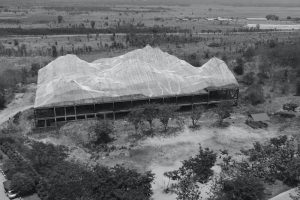Kochi-Muziris Biennale 2020
In our Veins Flow Ink and Fire
December 12, 2020–April 10, 2021
Kochi Biennale Foundation is pleased to be able to publish the curatorial note and the first list of artists for the Kochi-Muziris Biennale 2020: In our Veins Flow Ink and Fire. This fifth edition of the Biennale is curated by Singaporean artist Shubigi Rao. The exhibition, together with a programme of seminars, screenings, performances and workshops, will run for 120 days from December 12, 2020 to Apr 10, 2021 at various sites across the city of Kochi, India.
Curatorial Note
What do we find when we listen, read, record, think and make? For one, that even the most solitary of journeys is not one of isolation, but drinks deeply from that common wellspring of collective knowledge and ideas. Even when we work alone, we amplify the voices of others, and this form of sociability is why when we create, we are collective.
A biennale can be so much more than a mere accumulation of coincidental collisions. As a bulwark against despair the biennale as commons may seem an impossible idea. But we remember the ability of our species, our communities, to flourish artistically even in fraught and dire situations, with a refusal in the face of disillusionment to disavow our poetry, our languages, our art and music, our optimism and humour. To envision the Kochi-Muziris Biennale 2020 as a persistent yet unpredictable murmuration in the face of capriciousness and volatility comes from my unshakeable conviction in the power of storytelling as strategy, of the transgressive potency of ink, and transformative fire of satire and humour.
This optimism in practice—in artistic and in collective work, especially in regional or local contexts and forms—includes questions like the possibly redemptive and revolutionary power of practice beyond the market. We see this reflected in growing investigative methods in cultural work that directly excavate and implicate the monetisation of everything—whether environment, activism, crisis, knowledge production and access, global capital flows and inequities. Our co-mingled virtual futures are inextricable from the transmission of knowledge, ideas and capital, and so too are we subject to neoliberal infiltration and control. Implicated is the concept of nation and inviolability of borders, a pernicious myth that denies the diffusion of languages and ideas, of storytelling and sharing. The difference here is the rejection of the narrative as singular, choosing instead an embracing of submerged and manifold stories, and where, how, and through whose agencies they diverge.
A commons, then, is not just an archive that holds in stasis till activated. It is prolific, shapeshifting, and impure. Here we can read and listen, here meaning and implication can be glimpsed, parsed, reinterpreted and so live on in the minds of others, an ever expanding, rerouting, mutating web. This web also reaches across narrow geographical, theological and political concerns—solidarity crosses over, solidarity in the shared ideal, whether it be free speech, free press, individual liberty, defining the true spirit of the law and jurisprudence, and the emancipation of people.
The intersections of people and incidents, flashpoints of censorship and sites, all point to the crucial importance of the political, cultural, literary, scientific and philosophical climate necessary for ideas to thrive and flourish. There is unsurprisingly no perfect concatenation of circumstances, times or epochal characteristics necessary for ground-breaking work, ideas or revolutions. The human need to think freely without proscription, in spite of, and sometimes because of repression, all point to the way we react to conflict. The only enemy is apathy. That has no name or face and it lies entwined with its bedfellow—self-censorship.
The Kochi-Muziris Biennale 2020 therefore embodies the joy of experiencing practices of divergent sensibilities, under conditions both joyful and grim. There is optimism even in the darkest absurdity, and this is what leavens the direness of our time. It is in the robustness of humour that we can imagine the possibility of sustained kinship, and remember that we are not isolated in this fight. And that perhaps all that is required for an impossible ideal to exist is for enough people to live, think, and work as if it already does.
First list of the Kochi-Muziris Biennale 2020 artists
Ali Cherri (Beirut and Paris) | Arpita Singh (New Delhi) | Cecilia Vicuña (New York City and Santiago) | Colectivo Ayllu / Migrantes Transgresorxs (Alex Aguirre Sánchez, Leticia/Kimy Rojas, Francisco Godoy Vega, Yos Piña Narváez) (Madrid) | DAAR (Decolonizing Architecture Art Residency) (Palestine) | Dáiddadállu (represented by Maret Anne Sara, Hilde Skancke Pedersen, Elle Márjá Eira) (Guovdageaidnu/Kautokeino) | Gabriele Goliath (Johannesburg) | Iman Issa (Berlin) | Joan Jonas (New York City) | Martta Tuomaala (Helsinki) | Melati Suryodarmo (Gross Gleidingen and Surakarta) | Mithra Kamalam (Baroda) | Pio Abad and Frances Wadsworth Jones (London) | Priya Sen (New Delhi) | Richard Bell (Brisbane) | Sahil Naik (Baroda and Goa) | Samson Young (Hong Kong) | Seher Shah (New Delhi) | Slavs and Tatars (Berlin) | Thao Nguyen Phan (Ho Chi Minh City) | The u-ra-mi-li project (Anushka Meenakshi, Iswar Lalitha) (Pondicherry) | Thuma Collective (Khin Kyi Htet, Rita Khin, Shwe Wutt Hmon, Tin Htet Paing, Yu Yu Myint Than) (Yangon) | Vasudevan Akkitham (Baroda) | Yinka Shonibare (London) | Zina Saro-Wiwa (Los Angeles)


